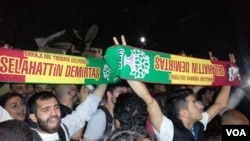Turkey's snap parliamentary election is scheduled to take place November 1, and much attention will be focused on the performance of the pro-Kurdish HDP party.
The HDP won enough votes in June's election to enter the parliament for the first time, robbing President Recep Tayyip Erdogan's AK Party of its parliamentary majority and dashing his hopes of creating an executive presidential system for the country.
Many observers believe that in order for the AK Party to regain its parliamentary majority, the HDP's vote totals in the November 1 election would have to be pushed below the 10-percent threshold required to enter parliament.
'Cycle of violence'
Sinan Ulgen, a visiting scholar at Carnegie Europe in Brussels, said the AK Party could be counting on the renewed fighting with the PKK Kurdish rebel group to take votes away from the HDP.
"There may be a hope [on] the AKP side that as a result of the cycle of violence, HDP may not be able to clear the 10-percent threshold, which would generate a clear AK majority, even a AK Party super-majority, which may allow Erdogan to move forward with a new constitution and achieve his ambitions to introduce the executive presidency," said Ulgen.
Erdogan is increasingly trying to link the HDP to the PKK, calling it a terrorist party and demanding the prosecution of the party’s parliamentary deputies.
Soli Ozel, an International relations expert at Istanbul’s Kadir Has University, said the renewed fighting with the PKK is driven by party politics.
"The war ... that has been reignited is mainly against the HDP, although of course you fight against those who have the guns," said Ozel.
Conservative Kurdish voters
Securing conservative Kurdish voters, however, will be key to the AK Party’s goal of driving the HDP out of parliament. Before the June election, Kurdish voters were evenly split between the AKP and pro-Kurdish parties.
Semih Idiz, a political columnist for Turkey’s Cumhuriyet newspaper, said Erdogan may have miscalculated.
"AK in the past could garner some support from the Kurdish parts of Turkey. If Erdogan advisers are expecting the situation now to scare the Kurdish voters back to the AKP, well, I think this is a gross miscalculation and that is where it will definitely backfire," said Idiz. "Which, in effect, means HDP will again pass the 10-percent threshold and enter parliament, and [in] the end nothing will have been achieved."
HDP co-leader Selahattin Demirtas has called on the PKK to observe an immediate cease-fire, but the rebels have rejected the appeal, saying they will not observe a unilateral cease-fire.
Still, observers say Demirtas’s call is important to his electoral success by positioning his party as a part of the solution to ending the fighting, rather than part of problem.




